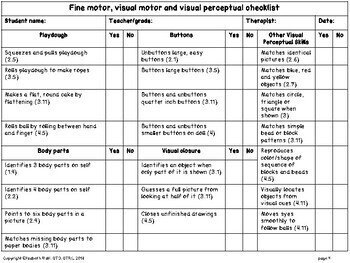So, you’re interested in learning more about OT developmental assessments? Well, you’ve come to the right place! This article serves as a comprehensive guide that will take you through the ins and outs of OT developmental assessments. Whether you’re a parent, caregiver, or healthcare professional, understanding the importance of these assessments and how they can benefit children’s development is crucial. From explaining what OT developmental assessments are to exploring the various types available, we’ll cover everything you need to know to navigate this field with confidence and understanding. So, fasten your seatbelt and get ready to embark on a journey that will shed light on the fascinating world of OT developmental assessments.
What are OT Developmental Assessments?
Definition and Purpose
OT developmental assessments are a crucial part of the occupational therapy process. These assessments are used to evaluate and measure an individual’s developmental skills, abilities, and overall functional performance. Occupational therapists use a variety of assessment tools and techniques to gather data and information about the individual’s physical, cognitive, sensory, and emotional development. The purpose of conducting these assessments is to identify any areas of concern or delay in development, determine the individual’s strengths and weaknesses, and provide a foundation for designing an individualized treatment plan.
Importance of OT Developmental Assessments
OT developmental assessments play a vital role in guiding occupational therapy intervention. By conducting comprehensive assessments, occupational therapists are able to gather valuable information about the individual’s abilities, limitations, and areas for improvement. These assessments help in identifying any developmental delays or difficulties that may be impacting the individual’s daily functioning. By understanding the specific areas of concern, occupational therapists can design tailored interventions and strategies to address these challenges and promote optimal development. Developmental assessments also provide a baseline for measuring progress and evaluating the effectiveness of intervention over time.
Who Conducts OT Developmental Assessments?
Occupational Therapists
OT developmental assessments are typically conducted by licensed occupational therapists who have undergone specialized training in assessing and evaluating various aspects of development. Occupational therapists have in-depth knowledge of human development across the lifespan and are skilled in using a wide range of standardized and non-standardized assessment tools. They are able to analyze assessment results, interpret them within the context of the individual’s personal and environmental factors, and use the findings to guide intervention planning and implementation.
Occupational Therapy Assistants
Under the supervision and guidance of occupational therapists, occupational therapy assistants may also assist in the administration of OT developmental assessments. Occupational therapy assistants work collaboratively with occupational therapists to gather data and provide support during the assessment process. While they may not have the same level of expertise as occupational therapists, their contributions are valuable in ensuring a comprehensive evaluation and supporting the overall assessment process.
Types of OT Developmental Assessments
Standardized Assessments
Standardized assessments in occupational therapy are pre-designed tools that have been validated and normed on a large sample of individuals. These assessments follow a structured format and have established administration and scoring procedures. Standardized assessments provide objective and reliable data, allowing for comparisons to be made between an individual’s performance and established normative standards. These assessments are commonly used in OT developmental assessments to measure specific aspects of development, such as fine motor skills, handwriting, sensory processing, and cognitive abilities.
Non-Standardized Assessments
Non-standardized assessments, also known as clinical observations or informal assessments, are more flexible and individualized. These assessments do not have a standardized format or scoring system and are often tailored to the unique needs and circumstances of the individual being assessed. Non-standardized assessments rely on clinical expertise and professional judgment to gather qualitative data about the individual’s behavior, skills, and functional performance. These assessments may involve direct observation, interviews with parents or caregivers, or structured play-based activities. Non-standardized assessments provide valuable insights into the individual’s everyday functioning, social interactions, and overall participation in daily activities.
Standardized Assessments
Overview
Standardized assessments are widely used in OT developmental assessments due to their reliability, objectivity, and ability to measure specific aspects of development. These assessments are administered and scored according to specific guidelines and protocols, ensuring consistency and comparability of results. Standardized assessments often consist of a series of tasks or questions that are designed to assess a particular area of development. The individual’s performance on these tasks is compared to standardized norms, allowing for the identification of any areas of delay or difficulty.
Examples of Standardized Assessments
There are numerous standardized assessments used in OT developmental assessments, each focusing on a different aspect of development. Some commonly used examples include:
- The Peabody Developmental Motor Scales (PDMS): This assessment evaluates gross and fine motor skills in infants and young children.
- The Bruininks-Oseretsky Test of Motor Proficiency (BOT-2): This assessment measures both fine and gross motor skills in children and adolescents.
- The Sensory Profile: This assessment assesses sensory processing patterns and modulation in individuals across the lifespan.
- The Wechsler Intelligence Scale for Children (WISC): This assessment measures cognitive abilities in children and provides a comprehensive profile of intellectual functioning.
These are just a few examples, and there are many more standardized assessments available for different areas of development.
Non-Standardized Assessments
Overview
Non-standardized assessments are an essential component of OT developmental assessments as they provide valuable qualitative data about the individual’s skills, behavior, and functional performance in real-life situations. These assessments are more flexible and individualized, allowing the occupational therapist to gather information that might not be captured by standardized assessments. Non-standardized assessments often involve direct observation of the individual’s performance during various tasks and activities, as well as interviews with parents or caregivers to gain further insights into the individual’s abilities and challenges.
Examples of Non-Standardized Assessments
There are several non-standardized assessments commonly used in OT developmental assessments. These assessments provide a deeper understanding of the individual’s development, abilities, and challenges in a more holistic context. Some examples of non-standardized assessments include:
- Clinical Observations: Direct observation of the individual during everyday activities, play, or school routines allows the occupational therapist to assess the individual’s functional performance, interactions with others, and overall engagement in occupations.
- Parent/Caregiver Interviews: By conducting interviews with parents or caregivers, the occupational therapist can gather information about the individual’s development, specific concerns, and observed difficulties. The interview process provides valuable insights into the individual’s strengths, weaknesses, and functional goals.
- Adaptive Behavior Assessments: These assessments evaluate the individual’s functional skills and abilities in various domains, such as communication, self-care, socialization, and motor skills. They provide a comprehensive understanding of the individual’s overall adaptive behavior and independence.
These non-standardized assessments offer a more holistic view of the individual’s development and functioning, complementing the information obtained from standardized assessments.
How are OT Developmental Assessments Conducted?
Initial Evaluation
The OT developmental assessment process typically begins with an initial evaluation. During this phase, the occupational therapist gathers information about the individual’s medical and developmental history, current concerns, and goals for therapy. The therapist may also assess the individual’s overall functional performance and conduct initial screenings or observations to identify any areas of immediate concern. The initial evaluation helps to establish a baseline understanding of the individual’s abilities and provides a starting point for further assessment and intervention.
Administering Assessments
Once the initial evaluation is completed, the occupational therapist selects and administers appropriate assessments based on the individual’s specific needs and goals. This may involve administering standardized assessment tools, non-standardized assessments, or a combination of both. The assessments are administered in a consistent and standardized manner, following the established protocols and guidelines provided by the assessment tool. The occupational therapist ensures that the individual is comfortable and understands the tasks or questions being presented, and provides support as needed.
Observation
In addition to formal assessments, direct observation plays a significant role in OT developmental assessments. The occupational therapist carefully observes the individual’s behavior, skills, and functional performance during various activities, both in structured assessment settings and in natural environments, such as home, school, or community settings. Observations provide valuable insights into the individual’s motor skills, sensory processing, social interaction, and overall participation in daily activities. By directly observing the individual in different contexts, the occupational therapist can gather more holistic and contextual information about their development.
Parent/Caregiver Interviews
Parent and caregiver interviews are an essential component of the assessment process as they provide valuable information about the individual’s development, daily routines, and challenges. The occupational therapist conducts interviews with parents or caregivers to gain insights into the individual’s strengths, weaknesses, and specific concerns. These interviews help to gather information about the individual’s developmental history, milestones, and any observed difficulties or delays. The therapist may also seek input on the individual’s goals and priorities, as well as any family or environmental factors that may influence their development.
Interpreting and Analyzing Assessment Results
Scoring and Interpretation
After completing the assessments, the occupational therapist scores and interprets the results. For standardized assessments, the therapist compares the individual’s performance to established norms and calculates standard scores or percentiles to quantify their performance. The occupational therapist analyzes the patterns of strengths and weaknesses across different areas of development and considers both qualitative and quantitative data. They interpret the assessment results within the context of the individual’s personal and environmental factors to gain a comprehensive understanding of their development, abilities, and challenges.
Identifying Areas of Concern
Based on the assessment results and interpretation, the occupational therapist identifies any areas of concern or delays in development. They determine which areas require intervention and focus, taking into account the impact on the individual’s daily functioning and participation in meaningful activities. Identifying areas of concern allows the occupational therapist to set specific goals for therapy and develop targeted intervention strategies to address the individual’s needs effectively.
Considering Contextual Factors
In addition to the individual’s developmental skills and abilities, the occupational therapist also considers contextual factors that may influence their development. These factors include the individual’s environment, family dynamics, cultural background, and any other relevant personal or environmental factors. By considering these contextual factors, the occupational therapist obtains a more comprehensive understanding of the individual’s development and can tailor the intervention to meet their specific needs and goals.
Collaboration and Communication with Other Professionals
Sharing Assessment Results
Effective collaboration and communication with other professionals involved in the individual’s care is crucial in OT developmental assessments. The occupational therapist shares assessment results with other healthcare providers, educators, and relevant team members to ensure a holistic approach to intervention. Sharing assessment results allows other professionals to understand the individual’s strengths, limitations, and areas of concern, enabling them to provide appropriate support and accommodations.
Contributing to Treatment Plan
The assessment results provide the foundation for developing an individualized treatment plan. The occupational therapist collaborates with the individual, their family, and other professionals involved to create a comprehensive plan that addresses the identified areas of concern. The treatment plan takes into account each individual’s unique goals, preferences, and needs. The occupational therapist’s expertise in interpreting assessment results plays a crucial role in determining the appropriate intervention strategies, goals, and expected outcomes.
Intervention Planning based on Assessment Results
Setting Goals
After analyzing the assessment results, the occupational therapist works with the individual, their family, and other professionals to set specific goals for therapy. These goals are based on the individual’s identified areas of concern, strengths, and priorities. The goals provide a roadmap for intervention and help to guide the therapy process. They are measurable, achievable, and tailored to meet the individual’s unique needs and circumstances. Setting goals ensures that the therapy is focused and targeted, addressing the individual’s specific developmental challenges.
Creating Individualized Treatment Plans
Using the assessment results as a guide, the occupational therapist creates an individualized treatment plan. The treatment plan outlines the strategies, activities, and interventions that will be used to address the individual’s developmental needs. It may include various therapeutic approaches, such as sensory integration techniques, therapeutic play, motor skill development, cognitive training, and assistive technology. The treatment plan is flexible and responsive, evolving as the individual progresses and their needs change.
Incorporating Evidence-Based Interventions
Occupational therapists base their interventions on evidence-based practices, which are interventions that have been scientifically proven to be effective through research and clinical experience. The assessment results inform the selection of evidence-based interventions that are aligned with the individual’s specific needs and goals. By using evidence-based interventions, occupational therapists ensure that the interventions provided are based on the best available research and are tailored to maximize the individual’s developmental progress.
Monitoring Progress and Re-assessment
Regular Evaluation of Intervention Effectiveness
Throughout the intervention process, the occupational therapist regularly evaluates the effectiveness of the interventions and monitors the individual’s progress. This ongoing evaluation allows the therapist to determine if the interventions are achieving the desired outcomes and if any adjustments or modifications need to be made. By regularly assessing the individual’s progress, the therapist ensures that the interventions remain relevant and effective, and makes any necessary changes to optimize the individual’s development.
Re-assessment to Track Developmental Progress
Periodic re-assessment is an essential part of the OT developmental assessment process. Re-assessment allows the occupational therapist to track the individual’s developmental progress over time and measure the effectiveness of the intervention. By re-administering assessments or conducting new assessments, the therapist can gather updated and comparative data to determine the individual’s developmental trajectory. Re-assessment provides valuable insights into the individual’s growth, areas of improvement, and ongoing challenges, guiding the therapist in making informed decisions about intervention planning and adjustments.
In conclusion, OT developmental assessments are crucial in identifying and addressing developmental delays and challenges. Through a combination of standardized and non-standardized assessments, occupational therapists gather comprehensive information about an individual’s development, abilities, and areas of concern. This information guides the creation of individualized treatment plans that incorporate evidence-based interventions. Regular evaluation and re-assessment ensure that interventions are effective and promote optimal developmental progress. By conducting thorough developmental assessments, occupational therapists play a vital role in helping individuals reach their full potential and achieve meaningful participation in daily activities.




